The song of songs第二十章
the song of achilles简介

the song of achilles简介
《雅典娜的歌》是美国女作家玛德琳·米勒的一部作品,以古希腊神话英雄阿喀琉斯为主角,讲述了他与爱人帕特罗克派之间的爱情故事。
这部小说以充满情感和战争的故事情节吸引了无数读者,深刻描绘了古希腊的风采和人性的复杂。
在这部小说中,作者运用了叙事的方式,将古希腊的英雄事迹与现实生活融为一体,展现了人类内心的复杂情感和挣扎。
阿喀琉斯作为一个出色的战士,却在爱情中表现得脆弱和无助,与帕特罗克派之间的纯真爱情感动人心。
作者通过这对情侣的故事,深刻揭示了人性的脆弱和坚强,引发了读者对爱情、友情和牺牲的反思。
除了情感纠葛,小说中对战争和英雄主题的探讨也颇具深意。
阿喀琉斯作为一个英勇的战士,却因为个人的情感而最终走向毁灭,这种对冲突的描述揭示了人性的弱点和脆弱。
作者通过战争的残酷和阿喀琉斯的牺牲,探讨了人类对权力和利益的渴望,以及对正义和伦理的思考。
这种对冲突和战争的描写,使得小说更具有思想性和深度。
在文学形式上,《雅典娜的歌》采用了古希腊传统的叙事方式,以及对史诗故事的借鉴。
作者通过描绘古希腊的风土人情和神话传说,为读者呈现了一个独特的文学世界。
小说中充满了古典的美学和浪漫主义情怀,让读者仿佛置身于古希腊的英雄时代,感受到了希腊神话的魅力和神秘。
总的来说,《雅典娜的歌》是一部充满了深意和情感的作品,通过对
古希腊英雄阿喀琉斯的描写,展现了人类内心的矛盾和挣扎。
作者通过对爱情和战争的探讨,引发了读者对人性的思考和反思。
这部小说不仅是一部娱乐作品,更是一部具有文学价值和思想深度的作品,值得广大读者细细品味。
song of the humpback课文
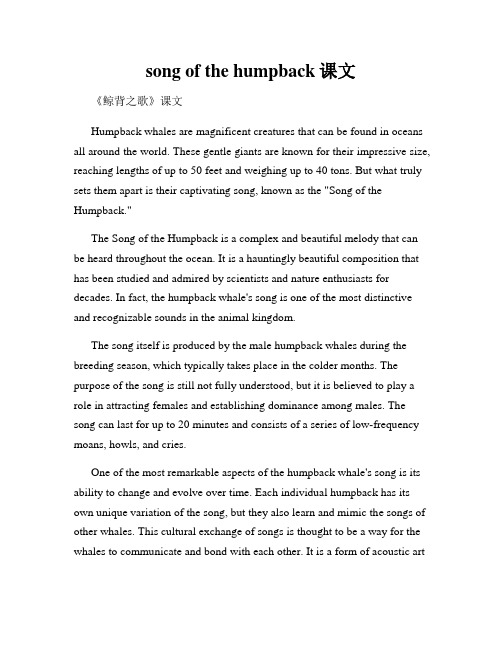
song of the humpback课文《鲸背之歌》课文Humpback whales are magnificent creatures that can be found in oceans all around the world. These gentle giants are known for their impressive size, reaching lengths of up to 50 feet and weighing up to 40 tons. But what truly sets them apart is their captivating song, known as the "Song of the Humpback."The Song of the Humpback is a complex and beautiful melody that can be heard throughout the ocean. It is a hauntingly beautiful composition that has been studied and admired by scientists and nature enthusiasts for decades. In fact, the humpback whale's song is one of the most distinctive and recognizable sounds in the animal kingdom.The song itself is produced by the male humpback whales during the breeding season, which typically takes place in the colder months. The purpose of the song is still not fully understood, but it is believed to play a role in attracting females and establishing dominance among males. The song can last for up to 20 minutes and consists of a series of low-frequency moans, howls, and cries.One of the most remarkable aspects of the humpback whale's song is its ability to change and evolve over time. Each individual humpback has its own unique variation of the song, but they also learn and mimic the songs of other whales. This cultural exchange of songs is thought to be a way for the whales to communicate and bond with each other. It is a form of acoustic artthat connects these majestic creatures in a way that is beyond our understanding.Researchers have spent countless hours analyzing and deciphering the humpback whale's song. By using hydrophones and other advanced recording equipment, they have been able to capture and study the intricate details of the song. Through these studies, scientists have discovered that the song follows a specific pattern and structure, similar to a musical composition. It consists of repeating themes and phrases, with subtle variations and improvisations.The humpback whale's song is not only a marvel of nature but also a reminder of the importance of conserving our oceans and protecting these incredible creatures. Sadly, humpback whales have faced many threats over the years, including commercial whaling and habitat destruction. However, thanks to conservation efforts and the banning of whaling, their populations have been slowly recovering.In conclusion, the Song of the Humpback is a mesmerizing display of the beauty and complexity of nature. It is a symphony that echoes throughout the vastness of the ocean, captivating all who have the privilege of hearing it. As we continue to learn more about these magnificent creatures, let us remember to cherish and protect them, ensuring that future generations can also experience the magic of the humpback whale's song.。
河之歌英文阅读理解
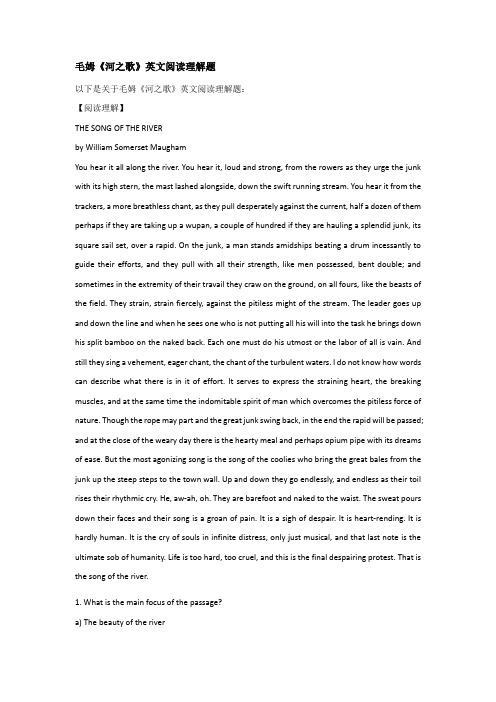
毛姆《河之歌》英文阅读理解题以下是关于毛姆《河之歌》英文阅读理解题:【阅读理解】THE SONG OF THE RIVERby William Somerset MaughamYou hear it all along the river. You hear it, loud and strong, from the rowers as they urge the junk with its high stern, the mast lashed alongside, down the swift running stream. You hear it from the trackers, a more breathless chant, as they pull desperately against the current, half a dozen of them perhaps if they are taking up a wupan, a couple of hundred if they are hauling a splendid junk, its square sail set, over a rapid. On the junk, a man stands amidships beating a drum incessantly to guide their efforts, and they pull with all their strength, like men possessed, bent double; and sometimes in the extremity of their travail they craw on the ground, on all fours, like the beasts of the field. They strain, strain fiercely, against the pitiless might of the stream. The leader goes up and down the line and when he sees one who is not putting all his will into the task he brings down his split bamboo on the naked back. Each one must do his utmost or the labor of all is vain. And still they sing a vehement, eager chant, the chant of the turbulent waters. I do not know how words can describe what there is in it of effort. It serves to express the straining heart, the breaking muscles, and at the same time the indomitable spirit of man which overcomes the pitiless force of nature. Though the rope may part and the great junk swing back, in the end the rapid will be passed; and at the close of the weary day there is the hearty meal and perhaps opium pipe with its dreams of ease. But the most agonizing song is the song of the coolies who bring the great bales from the junk up the steep steps to the town wall. Up and down they go endlessly, and endless as their toil rises their rhythmic cry. He, aw-ah, oh. They are barefoot and naked to the waist. The sweat pours down their faces and their song is a groan of pain. It is a sigh of despair. It is heart-rending. It is hardly human. It is the cry of souls in infinite distress, only just musical, and that last note is the ultimate sob of humanity. Life is too hard, too cruel, and this is the final despairing protest. That is the song of the river.1. What is the main focus of the passage?a) The beauty of the riverb) The strength and determination of the rowersc) The hardships faced by the cooliesd) The indomitable spirit of man2. What is the overall tone of "The Song of the River"?a) Hopeful and inspiringb) Desperate and sorrowfulc) Joyful and triumphantd) Melancholic and reflective3. What does the leader do if he sees one of the rowers not putting all his will into the task?a) He brings down his split bamboo on the naked back.b) He encourages him to try harder.c) He joins him in pulling against the current.d) He sings a softer, more soothing chant.4. What is the result of the rowers' efforts?a) The rope may part and the great junk swing back.b) They will eventually pass the rapid.c) They will be rewarded with a hearty meal.d) They will have the chance to smoke opium.5. How would you describe the song of the coolies bringing the great bales from the junk?a) Joyful and melodicb) Groaning and painfulc) Energetic and rhythmicd) Hopeful and inspiring。
圣诞颂歌(英汉对照) 中国学生英语文库

谢谢观看
写作背景
《圣诞颂歌》是英国大作家狄更斯创作的一系列圣诞故事中最著名的一篇,被称为“有史以来第二个最伟大 的圣诞故事”(第一个最伟大的圣诞故事无疑是指福音书中记载的耶稣基督诞生的故事)。《圣诞颂歌》问世 160年来,千百万人为之陶醉,受其鼓舞。许许多多的版本和译本以及根据它改编的舞台、电视、电影剧本层出 不穷。然而鲜为人知的是,这个“欢快、辉煌的”的圣诞故事竟产生于作家创作生涯的一个阴郁时期。狄更斯当 时濒临破产,情绪极为低落,他写作此书原是为了摆脱债务(他称之为“一个小小的图谋”),但很快便发生了 不可思议的变化。当他在写自己喜爱的圣诞故事时,沮丧的情绪一扫而光。《圣诞颂歌》成了作家一项出自爱心 的劳作。狄更斯曾谈到他是怎样在创作时“哭泣、大笑、又哭泣”的,他从未怀疑过,《圣诞颂歌》会受人喜爱, 但此书带来的压倒一切的轰动效应,却是他和出版商都始料未及的。狄更斯后来回忆道,第一版的6000册在圣诞 节前夜销售一空,后来不断重印,仍供不应求,一时颇有“英伦纸贵”之势。这种现象在维多利亚时代的图书市 场上是极为罕见的。在某种意义上,《圣诞颂歌》永远地改变了作家的一生。1843年以后,在短短几年间,狄更 斯又发表了若干与圣诞节有关的中篇小说,如《古教堂的钟声》等。
1843年的伦敦是个相当肮脏的城市。房屋拥挤,人们用煤火取暖(斯克鲁奇在办公室就是这样取暖的)。煤烟 同低空的云混在一起,所产生的浓雾远远比今天的要严重。但如果没有雾,而烟尘能够上升的话,寒冷的天气带 来的是更洁净的空气——当时没有小汽车、卡车和以燃油为动力的引擎——雪也是洁白而干净的。
在圣诞节介 Chapter1Marley'sghost 第1章马利的鬼魂 Chapter2ThefirstofthethreeSpirits 第2章三个幽灵中的第一个 Chapter3TheSecondofthethreeSpirits 第3章三个幽灵中的第二个 Chapter4Thelastofthethreespirits 第4章三个幽灵中的最后一个 Chapter5Theendof
song of motherland

顾庆芳
Background Content
Analyze Reason
WangXin, was born in 1918 in WuXi. He wrote this song in 1950.
五星红旗迎风飘扬, The Five-Star Red Flag Waving 胜利歌声多么响亮! How grand the victory sounds! 歌唱我们亲爱的祖国, Singing our beloved motherland
Analysis:
五星红旗迎风飘扬, The Five-Star Red Flag Waving 胜利歌声多么响亮! How grand the victory sounds! 歌唱我们亲爱的祖国, Singing our beloved motherland 从今走向繁荣富强! Rising toward rejuvenation! 歌唱我们亲爱的祖国, Singing our beloved motherland
That’s all, th toward rejuvenation!
I like this paragraph because is easy to understand, through constant repetition this paragraph as a poetry beauty of rhythm. It is very exciting.
我们爱和平,我们爱家乡. We love peace, we love our home
谁敢侵犯我们就叫他灭亡! Whoever invade shall be resisted!
东方太阳,正在升起, Sun of the east, is rising 人民共和国正在成长; People’s Republic is growing 我们领袖毛泽东, Our leader Mao Zedong 指引着前进的方向. Showing us the direction 我们的生活天天向上, Our life better and better
the sing song 牛津阅读讲解
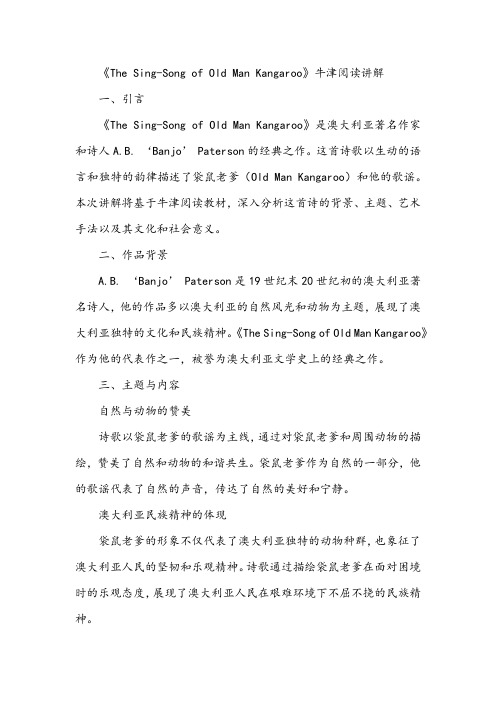
《The Sing-Song of Old Man Kangaroo》牛津阅读讲解一、引言《The Sing-Song of Old Man Kangaroo》是澳大利亚著名作家和诗人A.B. ‘Banjo’ Paterson的经典之作。
这首诗歌以生动的语言和独特的韵律描述了袋鼠老爹(Old Man Kangaroo)和他的歌谣。
本次讲解将基于牛津阅读教材,深入分析这首诗的背景、主题、艺术手法以及其文化和社会意义。
二、作品背景A.B. ‘Banjo’ Paterson是19世纪末20世纪初的澳大利亚著名诗人,他的作品多以澳大利亚的自然风光和动物为主题,展现了澳大利亚独特的文化和民族精神。
《The Sing-Song of Old Man Kangaroo》作为他的代表作之一,被誉为澳大利亚文学史上的经典之作。
三、主题与内容自然与动物的赞美诗歌以袋鼠老爹的歌谣为主线,通过对袋鼠老爹和周围动物的描绘,赞美了自然和动物的和谐共生。
袋鼠老爹作为自然的一部分,他的歌谣代表了自然的声音,传达了自然的美好和宁静。
澳大利亚民族精神的体现袋鼠老爹的形象不仅代表了澳大利亚独特的动物种群,也象征了澳大利亚人民的坚韧和乐观精神。
诗歌通过描绘袋鼠老爹在面对困境时的乐观态度,展现了澳大利亚人民在艰难环境下不屈不挠的民族精神。
四、艺术手法生动的语言和独特的韵律Paterson运用生动的语言和独特的韵律,使得诗歌读起来朗朗上口,富有节奏感。
他巧妙地运用押韵和重复等修辞手法,增强了诗歌的音乐性和感染力。
拟人化的动物形象诗歌中的袋鼠老爹被赋予了人类的情感和智慧,使得这个动物形象更加生动和立体。
通过与人类的对比,突出了袋鼠老爹的独特魅力和智慧,也传达了人类与自然和谐共生的理念。
五、文化和社会意义对澳大利亚文化的传承和发展《The Sing-Song of Old Man Kangaroo》作为澳大利亚文学史上的经典之作,对于传承和发展澳大利亚文化具有重要意义。
黑布林圣诞颂歌英语全文
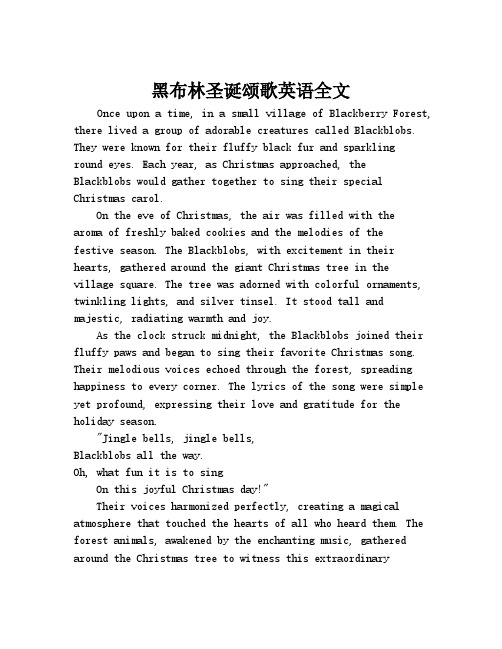
黑布林圣诞颂歌英语全文Once upon a time, in a small village of Blackberry Forest, there lived a group of adorable creatures called Blackblobs. They were known for their fluffy black fur and sparklinground eyes. Each year, as Christmas approached, theBlackblobs would gather together to sing their special Christmas carol.On the eve of Christmas, the air was filled with thearoma of freshly baked cookies and the melodies of thefestive season. The Blackblobs, with excitement in their hearts, gathered around the giant Christmas tree in thevillage square. The tree was adorned with colorful ornaments, twinkling lights, and silver tinsel. It stood tall and majestic, radiating warmth and joy.As the clock struck midnight, the Blackblobs joined their fluffy paws and began to sing their favorite Christmas song. Their melodious voices echoed through the forest, spreading happiness to every corner. The lyrics of the song were simple yet profound, expressing their love and gratitude for the holiday season."Jingle bells, jingle bells,Blackblobs all the way.Oh, what fun it is to singOn this joyful Christmas day!"Their voices harmonized perfectly, creating a magical atmosphere that touched the hearts of all who heard them. The forest animals, awakened by the enchanting music, gathered around the Christmas tree to witness this extraordinarymoment. Squirrels, rabbits, and even the wise old owlcouldn't resist the allure of the Blackblobs' singing.As the song reached its crescendo, flakes of glistening snow started to fall gently from the sky. The Blackblobs continued their serenade, their eyes shining with happiness and unity. Their song not only celebrated the magic of Christmas but also symbolized the bond between friends and family.In that special moment, the Blackblobs shared their love, joy, and warmth with everyone around them. Their song was a reminder that the true spirit of Christmas lies in the acts of kindness and the joy of coming together as a community.As their voices slowly faded away, the forest animals stayed silent, awestruck by the beauty of the Blackblobs' heartfelt performance. The air was filled with a sense of peace and harmony, as if the whole forest was a part of this wondrous celebration.And so, every year, the Blackblobs continued to singtheir cherished Christmas carol, spreading joy and love toall who crossed their path. The Blackberry Forest became famous for its remarkable Christmas tradition, attracting visitors from far and wide.As we reflect upon the tale of the Blackblobs and their magical song, let us remember the true meaning of Christmas. It is a time to cherish our loved ones, to spread cheer and goodwill, and to embrace the spirit of giving. May the Blackblobs' joyful melody inspire us all to make this Christmas a truly magical and unforgettable experience.In conclusion, the Blackblobs' Christmas carol has become a symbol of love, unity, and the magic of the holiday season.Let us celebrate this special time and embrace the joy it brings. Merry Christmas to all!。
The Book of Songs
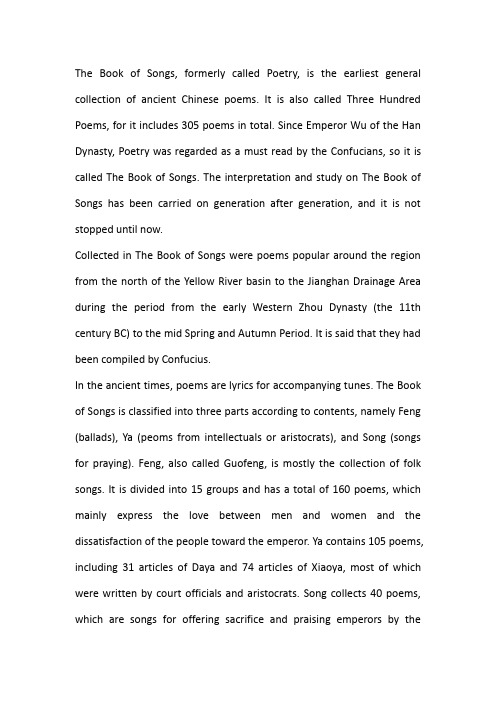
The Book of Songs, formerly called Poetry, is the earliest general collection of ancient Chinese poems. It is also called Three Hundred Poems, for it includes 305 poems in total. Since Emperor Wu of the Han Dynasty, Poetry was regarded as a must read by the Confucians, so it is called The Book of Songs. The interpretation and study on The Book of Songs has been carried on generation after generation, and it is not stopped until now.Collected in The Book of Songs were poems popular around the region from the north of the Yellow River basin to the Jianghan Drainage Area during the period from the early Western Zhou Dynasty (the 11th century BC) to the mid Spring and Autumn Period. It is said that they had been compiled by Confucius.In the ancient times, poems are lyrics for accompanying tunes. The Book of Songs is classified into three parts according to contents, namely Feng (ballads), Ya (peoms from intellectuals or aristocrats), and Song (songs for praying). Feng, also called Guofeng, is mostly the collection of folk songs. It is divided into 15 groups and has a total of 160 poems, which mainly express the love between men and women and the dissatisfaction of the people toward the emperor. Ya contains 105 poems, including 31 articles of Daya and 74 articles of Xiaoya, most of which were written by court officials and aristocrats. Song collects 40 poems, which are songs for offering sacrifice and praising emperors by thearistocrats. They are usually accompanied with dance during the performance. Although the Book of Songs is a collection of works of many people, authors of most works are unknown, just a small part of them were researched out by later generations.The Book of Songs exerted a very profound effect on ancient China in terms of politics, culture, language, and even thinking. During the Spring and Autumn Period, diplomats often expressed words that they didn’t want to say by themselves or that were difficult to say by quoting sentences from the Book of Songs, which is similar to today’s diplomatic language. Confucius, a sage of China and who gave a high praise to the Book of Songs, claimed that people’s cultures, observation abilities and interpersonal skills could be highly improved through the study of the Book of Songs.《诗经》,以前叫诗,诗是中国古代诗歌最早的一般集合。
TheLoveSongofJ.AlfredPrufrock中英全文对照

The Love Song of J. Alfred Prufro ckT.S.Eliot1.S’iocredes se che mia rispos ta fosse2. A person a che mai tornas se al mondo,3.Questa fiamma staria senzapiu scosse.4.Ma percio cchegiamma i di questo fondo5.Non tornovivo alcun,s’i’odoilv ero,6.Senzatemad’infami a ti rispon do.7.Let us go then, you and I,8.When the evenin g is spread out agains t the sky9.Like a patien t etheri zed upon a table;10.Let us go, throug h certai n half-desert ed street s,11.The mutter ing retrea ts12.Of restle ss nights in one-nightcheaphotels13.And sawdus t restau rants with oyster-shells:14.Street s that follow like a tediou s argume nt15.Of insidi ous intent16.To lead you to an overwh elmin g questi on ...17.Oh,donotask,“Whatisit?“18.Let us go and make our visit.19.In the room the womencome and go20.Talkin g of Michel angel o.21.The yellow fog that rubs its back upon the window-panes,22.The yellow smokethat rubs its muzzle on the window-panes,23.Licked its tongue into the corner s of the evenin g,24.Linger ed upon the poolsthat standin drains,25.Let fall upon its back the soot that fallsfrom chimne ys,26.Slippe d by the terrac e, made a sudden leap,27.And seeing that it was a soft Octobe r night,28.Curled once aboutthe house, and fell asleep.29.And indeed therewill be time30.For the yellow smokethat slides alongthe street,31.Rubbin g its back upon the window-panes;32.Therewill be time, therewill be time33.To prepar e a face to meet the facesthat you meet;34.Therewill be time to murder and create,35.And time for all the worksand days of hands36.That lift and drop a questi on on your plate;37.Time for you and time for me,38.And time yet for a hundre d indeci sions,39.And for a hundre d vision s and revisi ons,40.Before the taking of a toastand tea.41.In the room the womencome and go42.Talkin g of Michel angel o.43.And indeed therewill be time44.To wonder,“DoIdare?“and,“DoIdare?“45.Time to turn back and descen d the stair,46.With a bald spot in the middle of my hair--47.(Theywillsay:“Howhishair is growin gthin!“)48.My mornin g coat, my collar mounti ng firmly to the chin,49.My neckti e rich and modest, but assert ed by a simple pin--50.(Theywillsay:“Buthowhisarmsandlegsarethin!“)51.Do I dare52.Distur b the univer se?53.In a minute thereis time54.For decisi ons and revisi ons whicha minute will revers e.55.For I have knownthem all alread y, knownthem all:56.Have knownthe evenin gs, mornin gs, aftern oons,57.I have measur ed out my life with coffee spoons;58.I know the voices dyingwith a dyingfall59.Beneat h the musicfrom a farthe r room.60.So how should I presum e?61.And I have knownthe eyes alread y, knownthem all--62.The eyes that fix you in a formul atedphrase,63.And when I am formul ated, sprawl ing on a pin,64.When I am pinned and wriggl ing on the wall,65.Then how should I begin66.To spit out all the butt-ends of my days and ways?67.And how should I presum e?68.And I have knownthe arms alread y, knownthem all--69.Arms that are bracel etedand whiteand bare70.(But in the lampli ght, downed with lightbrownhair!)71.Is it perfum e from a dress72.That makesme so digres s?73.Arms that lie alonga table, or wrap abouta shawl.74.And should I then presum e?75.And how should I begin?76.ShallI say, I have gone at dusk throug h narrow street s77.And watche d the smokethat risesfrom the pipes78.Of lonely men in shirt-sleeve s, leanin g out of window s? ...79.I should have been a pair of ragged claws80.Scuttl ing across the floors of silent seas.81.And the aftern oon, the evenin g, sleeps so peacef ully!82.Smooth ed by long finger s,83.Asleep ... tired... or it maling ers,84.Stretc hed on the floor, here beside you and me.85.Should I, aftertea and cakesand ices,86.Have the streng th to forcethe moment to its crisis?87.But though I have wept and fasted, wept and prayed,88.Though I have seen my head (grownslight ly bald) brough t in upon a platte r,89.I am no prophe t--and here抯no greatmatter;90.I have seen the moment of my greatn ess flicke r,91.And I have seen the eterna l Footma n hold my coat, and snicke r,92.And in short, I was afraid.93.And wouldit have been worthit, afterall,94.Afterthe cups, the marmal ade, the tea,95.Amongthe porcel ain, amongsome talk of you and me,96.Wouldit have been worthwhile,97.To have bitten off the matter with a smile,98.To have squeez ed the univer se into a ball99.To roll it toward some overwh elmin g questi on,100.To say: “IamLazaru s, come from the dead,e back to tell you all, I shalltellyouall“--102.If one, settli ng a pillow by her head,**103.Should say: “ThatisnotwhatImeantat all;104.Thatisnotit,atall.“105.And wouldit have been worthit, afterall,106.Wouldit have been worthwhile,107.Afterthe sunset s and the doorya rds and the sprink led street s,108.Afterthe novels, afterthe teacup s, afterthe skirts that trailalongthe floor-- 109.And this, and so much more?--110.It is imposs ibleto say just what I mean I111.But as if a magiclanter n threwthe nerves in patter ns on a screen:112.Wouldit have been worthwhile113.If one, settli ng a pillow or throwi ng off a shawl,114.And turnin g toward the window, should say:115.“Thatisnotitatall,116.That is not what I meant,atall.“117.No I am not Prince Hamlet, nor was meantto be;118.Am an attend ant lord, one that will do119.To swella progre ss, starta sceneor two,120.Advise the prince; no doubt, an easy tool,121.Defere ntial, glad to be of use,122.Politi c, cautio us, and meticu lous;123.Full of high senten ce, but a bit obtuse;124.At times, indeed, almost ridicu lous--125.Almost, at times, the Fool.126.I grow old ... I grow old ...127.I shallwear the bottom s of my trouse rs rolled.128.ShallI part my hair behind? Do I dare to eat a peach? 129.I shallwear whiteflanne l trouse rs, and walk upon the beach. 130.I have heardthe mermai ds singin g, each to each.131.I do not thinkthat they will sing to me.132.I have seen them riding seawar d on the wavesbin g the whitehair of the wavesblownback134.When the wind blowsthe waterwhiteand black.135.We have linger ed in the chambe rs of the sea136.By sea-girlswreath ed with seawee d red and brown137.Till humanvoices wake us, and we drown.J·阿尔弗瑞德·普鲁弗洛克的情歌查良铮译1.假如我认为,我是回答2.一个能转回阳世间的人,3.那么,这火焰就不会再摇闪。
songofmyself全诗歌
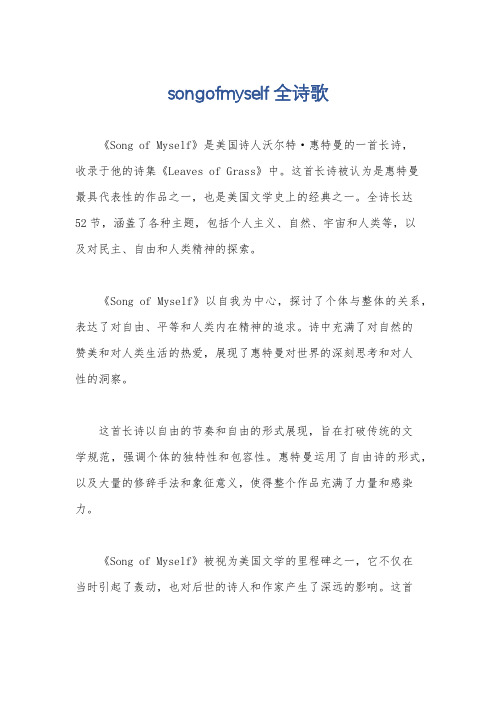
songofmyself全诗歌
《Song of Myself》是美国诗人沃尔特·惠特曼的一首长诗,
收录于他的诗集《Leaves of Grass》中。
这首长诗被认为是惠特曼
最具代表性的作品之一,也是美国文学史上的经典之一。
全诗长达
52节,涵盖了各种主题,包括个人主义、自然、宇宙和人类等,以
及对民主、自由和人类精神的探索。
《Song of Myself》以自我为中心,探讨了个体与整体的关系,表达了对自由、平等和人类内在精神的追求。
诗中充满了对自然的
赞美和对人类生活的热爱,展现了惠特曼对世界的深刻思考和对人
性的洞察。
这首长诗以自由的节奏和自由的形式展现,旨在打破传统的文
学规范,强调个体的独特性和包容性。
惠特曼运用了自由诗的形式,以及大量的修辞手法和象征意义,使得整个作品充满了力量和感染力。
《Song of Myself》被视为美国文学的里程碑之一,它不仅在
当时引起了轰动,也对后世的诗人和作家产生了深远的影响。
这首
诗通过对个人与整体、自然与人类、灵魂与身体等问题的探讨,展
现了惠特曼对世界和人类的独特见解,成为了一部永恒的文学经典。
songofmyself英汉对照
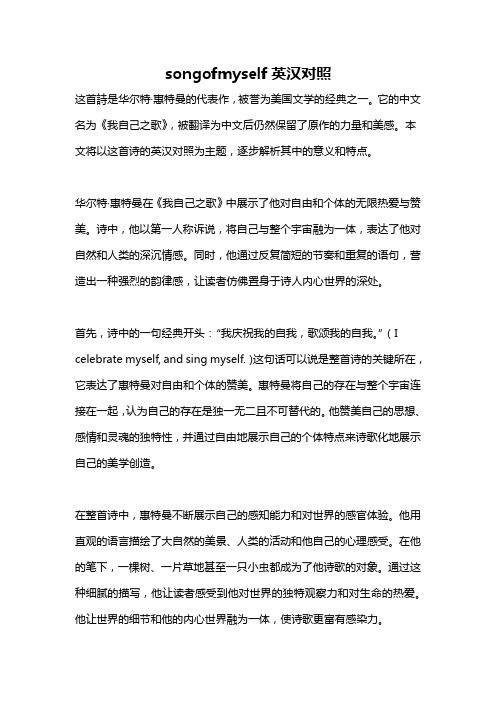
songofmyself英汉对照这首詩是华尔特·惠特曼的代表作,被誉为美国文学的经典之一。
它的中文名为《我自己之歌》,被翻译为中文后仍然保留了原作的力量和美感。
本文将以这首诗的英汉对照为主题,逐步解析其中的意义和特点。
华尔特·惠特曼在《我自己之歌》中展示了他对自由和个体的无限热爱与赞美。
诗中,他以第一人称诉说,将自己与整个宇宙融为一体,表达了他对自然和人类的深沉情感。
同时,他通过反复简短的节奏和重复的语句,营造出一种强烈的韵律感,让读者仿佛置身于诗人内心世界的深处。
首先,诗中的一句经典开头:“我庆祝我的自我,歌颂我的自我。
”(I celebrate myself, and sing myself.)这句话可以说是整首诗的关键所在,它表达了惠特曼对自由和个体的赞美。
惠特曼将自己的存在与整个宇宙连接在一起,认为自己的存在是独一无二且不可替代的。
他赞美自己的思想、感情和灵魂的独特性,并通过自由地展示自己的个体特点来诗歌化地展示自己的美学创造。
在整首诗中,惠特曼不断展示自己的感知能力和对世界的感官体验。
他用直观的语言描绘了大自然的美景、人类的活动和他自己的心理感受。
在他的笔下,一棵树、一片草地甚至一只小虫都成为了他诗歌的对象。
通过这种细腻的描写,他让读者感受到他对世界的独特观察力和对生命的热爱。
他让世界的细节和他的内心世界融为一体,使诗歌更富有感染力。
诗中最引人注目的特点之一是其长句和长段落。
惠特曼用宽敞的句子和行间距,创造了一种宏伟的诗史气息。
他将自己的诗歌与古代史诗和宗教经典相提并论,并通过这样的笔调展示了他对自己及其创造的作品的肯定。
虽然诗中的一些长句可能让读者感到困惑,但它们的存在使整个诗篇更加庄重和深刻。
最后,诗中的反复和对自然的赞美是《我自己之歌》最重要的主题之一。
在诗中,惠特曼不断地重复表达对世界的赞美和对自己与自然的融合的喜悦。
他借助诗歌,将自己的灵魂与大自然相连,感受到了生命的无限可能性。
陈田鹤的歌曲创作

华东师范大学硕士学位论文陈田鹤的歌曲创作姓名:***申请学位级别:硕士专业:音乐学指导教师:***201105摘要陈田鹤是我国近代音乐史上一位卓有成就的音乐教育家和作曲家。
他出生丁.1911年,经历过五四运动、抗日战争以及后来的革命斗争岁月,也见证了新中国的成长。
_Ⅱ三冈为如此,他的音乐创作从艺术的角度反映了历史的进程,同时也蕴含着他的人生体验,富有深刻的内涵。
陈田鹤是中国第一批自己培养的音乐家之一,他与贺绿汀、刘雪庵、江定仙并称为黄白的“四人弟子”。
陈田鹤的音乐继承了老师黄白的细腻、优雅、含蓄的美,同时义具有自己独特的艺术性。
他注重诗词,对诗词的要求非常高,并且注重歌曲的意境和形式美,钢琴织体清新雅致,_手Il卢处理别具匠心,其歌曲具有鲜明的时代性和隽永的艺术性。
陈田鹤一生创作有钢琴作品(5首,《序曲》与《血债》较为著名)、民歌改编曲(8首,《在那遥远的地方》)、器乐曲(9首)、声乐套曲(4首)等,但最重要的莫过于他在歌曲创作上的成就。
迄今为I卜能找到的谱子共有一百零三首,大致可以分为三类:抒情歌曲(34首)、儿童歌曲(32首)、社会性政治性歌曲(41首,以抗战歌曲为多)。
老师在教学中往往侧重于西洋歌剧选段和艺术歌曲,二十世纪30、40年代的中国歌曲涉及的甚少,我们所熟悉的也仅是少数十来首,比如赵元任的《教我如何不想他》、《老天爷》,黄白的《玫瑰三愿》、《思乡》、《花非花》,青土的《我住长江头》,刘雪庵的《红豆词》,聂耳的《铁蹄下的歌女》,冼星海的《黄河颂》、《黄水谣》,贺绿汀的《嘉陵江上》等等。
而陈田鹤的作品,到了上世纪80年代之后才稍有涉猎。
他的歌曲创作在我国近现代音乐史上占有不可替代的地位,是我国文化曲库中弥足珍贵的精品,引起了音乐学者的重视。
陈田鹤的歌曲作品除儿童歌曲和反映抗日救亡主题的爱国歌曲之外,最值得研究的是为古诗词和白话新诗谱曲的艺术歌曲,如取自唐代诗人张继的七绝《枫桥夜泊》,取白宋代词人黄庭坚《清平乐》的《春l门何处》,取自宋代词人秦观词作的《江城子》,为现代诗人徐:占摩诗歌谱曲的《山中》,为廖辅叔的诗歌谱写的《回忆》,为郭沫若诗歌谱写的《牧歌》,为戴望舒诗歌谱写的《秋天的梦》等等,这些作品在词曲结合、旋律和声、钢琴写作等方面形成了陈田鹤特有的艺术风格,很值得我们研究、学习。
the song of the river 河之歌
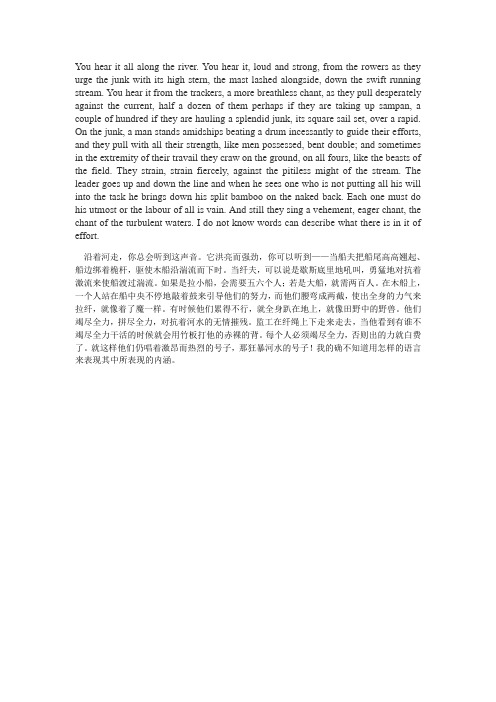
You hear it all along the river. You hear it, loud and strong, from the rowers as they urge the junk with its high stern, the mast lashed alongside, down the swift running stream. You hear it from the trackers, a more breathless chant, as they pull desperately against the current, half a dozen of them perhaps if they are taking up sampan, a couple of hundred if they are hauling a splendid junk, its square sail set, over a rapid. On the junk, a man stands amidships beating a drum incessantly to guide their efforts, and they pull with all their strength, like men possessed, bent double; and sometimes in the extremity of their travail they craw on the ground, on all fours, like the beasts of the field. They strain, strain fiercely, against the pitiless might of the stream. The leader goes up and down the line and when he sees one who is not putting all his will into the task he brings down his split bamboo on the naked back. Each one must do his utmost or the labour of all is vain. And still they sing a vehement, eager chant, the chant of the turbulent waters. I do not know words can describe what there is in it of effort.沿着河走,你总会听到这声音。
The Book of Songs
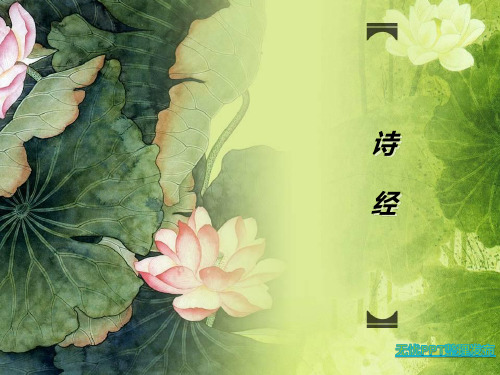
绿兮衣兮, 绿衣黄里。
心之忧矣,
曷维其已!
Green is the upper robe, Green with a yellow lining! The sorrow of my heart, – How can it cease?
绿兮衣兮,Green
is the upper robe, 绿衣黄裳。Green the upper, and yellow the lower garment! 心之忧矣,The sorrow of my heart, – 曷维其亡! How can it be forgotten? [Dyed] green has been the silk; – 女所治兮。It was you who did it. 我思古人, [But] I think of the ancients, 俾无訧兮!That I may be kept from doing wrong.
桃夭
桃之夭夭,灼灼其华。之子于归,宜其室家。 桃之夭夭,有蕡其实。之子于归,宜其家室。 桃之夭夭,其叶蓁蓁。之子于归,宜其家人。 【注释】 01、夭夭:桃花含苞貌。一说形容茂盛而艳丽,或 说少壮的样子。 02、灼灼(Zhuo):鲜明貌 03、之子:这个人 04、归:妇人谓嫁曰归;于归,古时称女子出嫁。 05、宜:仪。《尔雅》注“仪:善也”,此句说欢 喜高兴成了家。 06、室家:夫妇。男子有妻曰有室,女子有夫为有 家。 07、有蕡(Fen):有,作语气助词,无实义。蕡, 《集传》注“蕡:实之盛也”,即果实成熟长大的样子。 08、蓁蓁(Zhen):草木茂盛貌
Contents
風 160 folk songs (or airs) 小雅 74 minor festal songs (or odes traditionally sung at court festivities) 大雅 31 major festal songs, sung at more solemn court ceremonies 頌 40 hymns and eulogies , sung at sacrifices to gods and ancestral spirits of the royal house
TheLoveSongofJ_AlfredPrufrock译文PDF
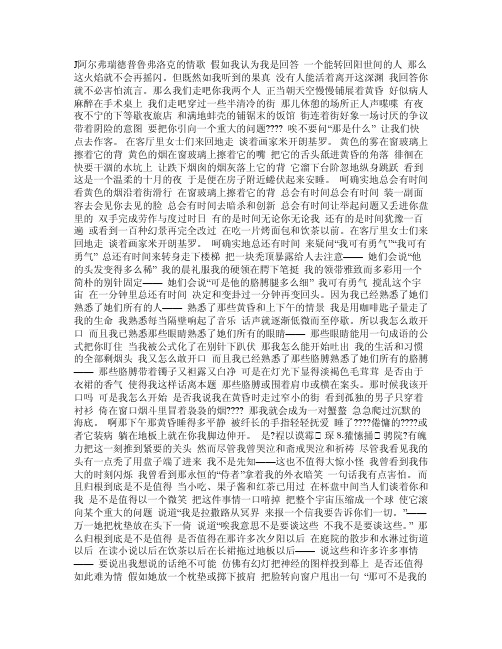
J阿尔弗瑞德普鲁弗洛克的情歌假如我认为我是回答一个能转回阳世间的人那么这火焰就不会再摇闪。
但既然如我听到的果真没有人能活着离开这深渊我回答你就不必害怕流言。
那么我们走吧你我两个人正当朝天空慢慢铺展着黄昏好似病人麻醉在手术桌上我们走吧穿过一些半清冷的街那儿休憩的场所正人声喋喋有夜夜不宁的下等歇夜旅店和满地蚌壳的铺锯末的饭馆街连着街好象一场讨厌的争议带着阴险的意图要把你引向一个重大的问题唉不要问“那是什么” 让我们快点去作客。
在客厅里女士们来回地走谈着画家米开朗基罗。
黄色的雾在窗玻璃上擦着它的背黄色的烟在窗玻璃上擦着它的嘴把它的舌头舐进黄昏的角落徘徊在快要干涸的水坑上让跌下烟囱的烟灰落上它的背它溜下台阶忽地纵身跳跃看到这是一个温柔的十月的夜于是便在房子附近蜷伏起来安睡。
呵确实地总会有时间看黄色的烟沿着街滑行在窗玻璃上擦着它的背总会有时间总会有时间装一副面容去会见你去见的脸总会有时间去暗杀和创新总会有时间让举起问题又丢进你盘里的双手完成劳作与度过时日有的是时间无论你无论我还有的是时间犹豫一百遍或看到一百种幻景再完全改过在吃一片烤面包和饮茶以前。
在客厅里女士们来回地走谈着画家米开朗基罗。
呵确实地总还有时间来疑问“我可有勇气”“我可有勇气” 总还有时间来转身走下楼梯把一块秃顶暴露给人去注意——她们会说“他的头发变得多么稀” 我的晨礼服我的硬领在腭下笔挺我的领带雅致而多彩用一个简朴的别针固定——她们会说“可是他的胳膊腿多么细” 我可有勇气搅乱这个宇宙在一分钟里总还有时间决定和变卦过一分钟再变回头。
因为我已经熟悉了她们熟悉了她们所有的人——熟悉了那些黄昏和上下午的情景我是用咖啡匙子量走了我的生命我熟悉每当隔壁响起了音乐话声就逐渐低微而至停歇。
所以我怎么敢开口而且我已熟悉那些眼睛熟悉了她们所有的眼睛——那些眼睛能用一句成语的公式把你盯住当我被公式化了在别针下趴伏那我怎么能开始吐出我的生活和习惯的全部剩烟头我又怎么敢开口而且我已经熟悉了那些胳膊熟悉了她们所有的胳膊——那些胳膊带着镯子又袒露又白净可是在灯光下显得淡褐色毛茸茸是否由于衣裙的香气使得我这样话离本题那些胳膊或围着肩巾或横在案头。
The-Love-Song-of-J.-Alfred-Prufrock中英全文对照

The Love Song of J。
Alfred PrufrockT。
S。
Eliot1.S'io credesse che mia risposta fosse2. A persona che mai tornasse al mondo,3.Questa fiamma staria senza piu scosse。
4.Ma perciocche giammai di questo fondo5.Non torno vivo alcun, s’i'odo il vero,6.Senza tema d’inf amia ti rispondo.7.Let us go then,you and I,8.When the evening is spread out against the sky9.Like a patient etherized upon a table;10.Let us go, through certain half—deserted streets,11.The muttering retreats12.Of restless nights in one—night cheap hotels13.And sawdust restaurants with oyster-shells:14.Streets that follow like a tedious argument15.Of insidious intent16.To lead you to an overwhelming question ..。
17.Oh, do not ask, “What is it?“18.Let us go and make our visit.19.In the room the women come and go20.Talking of Michelangelo.21.The yellow fog that rubs its back upon the window—panes,22.The yellow smoke that rubs its muzzle on the window—panes,23.Licked its tongue into the corners of the evening,24.Lingered upon the pools that stand in drains,25.Let fall upon its back the soot that falls from chimneys,26.Slipped by the terrace,made a sudden leap,27.And seeing that it was a soft October night,28.Curled once about the house,and fell asleep.29.And indeed there will be time30.For the yellow smoke that slides along the street,31.Rubbing its back upon the window—panes;32.There will be time, there will be time33.To prepare a face to meet the faces that you meet;34.There will be time to murder and create,35.And time for all the works and days of hands36.That lift and drop a question on your plate;37.Time for you and time for me,38.And time yet for a hundred indecisions,39.And for a hundred visions and revisions,40.Before the taking of a toast and tea。
英语散文:TheSongoftheRiver(河之歌)
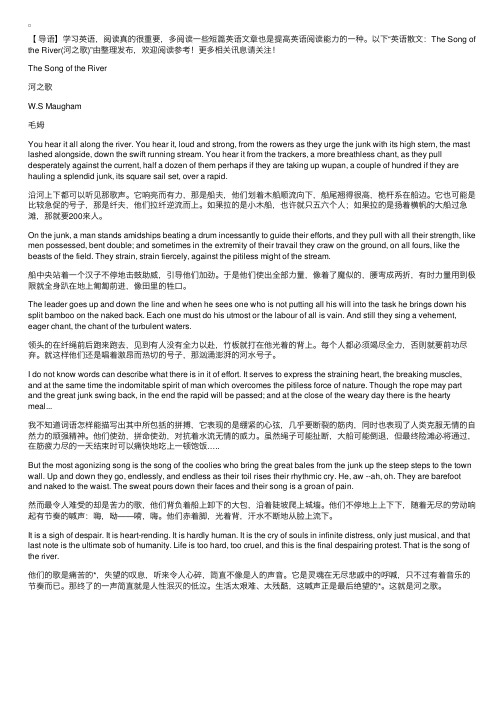
【导语】学习英语,阅读真的很重要,多阅读⼀些短篇英语⽂章也是提⾼英语阅读能⼒的⼀种。
以下“英语散⽂:The Song of the River(河之歌)”由整理发布,欢迎阅读参考!更多相关讯息请关注!The Song of the River河之歌W.S Maugham⽑姆You hear it all along the river. You hear it, loud and strong, from the rowers as they urge the junk with its high stern, the mast lashed alongside, down the swift running stream. You hear it from the trackers, a more breathless chant, as they pull desperately against the current, half a dozen of them perhaps if they are taking up wupan, a couple of hundred if they are hauling a splendid junk, its square sail set, over a rapid.沿河上下都可以听见那歌声。
它响亮⽽有⼒,那是船夫,他们划着⽊船顺流向下,船尾翘得很⾼,桅杆系在船边。
它也可能是⽐较急促的号⼦,那是纤夫,他们拉纤逆流⽽上。
如果拉的是⼩⽊船,也许就只五六个⼈;如果拉的是扬着横帆的⼤船过急滩,那就要200来⼈。
On the junk, a man stands amidships beating a drum incessantly to guide their efforts, and they pull with all their strength, like men possessed, bent double; and sometimes in the extremity of their travail they craw on the ground, on all fours, like the beasts of the field. They strain, strain fiercely, against the pitiless might of the stream.船中央站着⼀个汉⼦不停地击⿎助威,引导他们加劲。
- 1、下载文档前请自行甄别文档内容的完整性,平台不提供额外的编辑、内容补充、找答案等附加服务。
- 2、"仅部分预览"的文档,不可在线预览部分如存在完整性等问题,可反馈申请退款(可完整预览的文档不适用该条件!)。
- 3、如文档侵犯您的权益,请联系客服反馈,我们会尽快为您处理(人工客服工作时间:9:00-18:30)。
Chapter 20It was a lovely night, so warm that he threw his coat over his arm and did not even put his silk scarf round his throat. As he strolled home, smoking his cigarette, two young men in evening dress passed him. He heard one of them whisper to the other, "That is Dorian Gray." He remembered how pleased he used to be when he was pointed out, or stared at, or talked about. He was tired of hearing his own name now. Half the charm of the little village where he had been so often lately was that no one knew who he was. He had often told the girl whom he had lured to love him that he was poor, and she had believed him. He had told her once that he was wicked, and she had laughed at him and answered that wicked people were always very old and very ugly. What a laugh she had!--just like a thrush singing. And how pretty she had been in her cotton dresses and her large hats! She knew nothing, but she had everything that he had lost.When he reached home, he found his servant waiting up for him. He sent him to b ed, and threw himself down on the sofa in the library, and began to think over some of the things that Lord Henry had said to him.Was it really true that one could never change? He felt a wild longing for the unstained purity of his boyhood-- his rose-white boyhood, as Lord Henry had once called it. He knew that he had tarnished himself, filled his mind with corruption and given horror to his fancy; that he had been an evil influence to others, and had experienced a terrible joy in being so; and that of the lives that had crossed his own, it had been the fairest and the most full of promise that he had brought to shame. But was it all irretrievable? Was there no hope for him?Ah! in what a monstrous moment of pride and passion he had prayed that the portrait should bear the burden of his days, and he keep the unsullied splendour of eternal youth!All his failure had been due to that. Better for him that each sin of his life had brought its sure swift penalty along with it. There was purification in punishment. Not "Forgive us our sins" but "Smite us for our iniquities" should be the prayer of man to a most just God.The curiously carved mirror that Lord Henry had given to him, so many years ago now, was standing on the table, and the white-limbed Cupids laughed round it as of old. He took it up, as he had done on that night of horror when be had first noted the change in the fatal picture, and with wild, tear-dimmed eyes looked into its polished shield. Once, some one who had terribly loved him had written to him a mad letter, ending with these idolatrous words: "The world is changed because you are made of ivory and gold. The curves of your lips rewrite history." The phrases came back to his memory, and he repeated them over and over to himself. Then he loathed his own beauty, and flinging the mirror on the floor, crushed it into silver splinters beneath his heel. It was his beauty that had ruined him, his beauty and the youth that he had prayed for. But for those two things, his life might have been free from stain. His beauty had been to him but a mask, his youth but a mockery. What was youth at best? A green, an unripe time, a time of shallow moods, and sickly thoughts. Why had he worn its livery? Youth had spoiled him.It was better not to think of the past. Nothing could alter that. It was of himself, and of his own future, that he had to think. James Vane was hidden in a nameless grave in Selby churchyard. Alan Campbell had shot himself one night in his laboratory, but had not revealed the secret that he had been forced to know. The excitement, such as it was, over Basil Hallward's disappearance would soon pass away. It was already waning. He was perfectly safe there. Nor, indeed, was it the death of Basil Hallward that weighed most upon his mind. It was the living death of his own soul that troubled him. Basil had painted the portrait that had marred his life. He could not forgive him that. It was the portrait that had done everything. Basil had said things to him that were unbearable, and that he had yet borne with patience. The murder had been simply the madness of a moment. As forAlan Campbell, his suicide had been his own act. He had chosen to do it. It was nothing to him.A new life! That was what he wanted. That was what he was waiting for. Surely he had begun it already. He had spared one innocent thing, at any rate. He would never again tempt innocence. He would be good.As he thought of Hetty Merton, he began to wonder if the portrait in the locked room had changed. Surely it was not still so horrible as it had been? Perhaps if his life became pure, he would be able to expel every sign of evil passion from the face. Perhaps the signs of evil had already gone away. He would go and look.He took the lamp from the table and crept upstairs. As he unbarred the door, a smile of joy flitted across his strangely young-looking face and lingered for a moment about his lips. Yes, he would be good, and the hideous thing that he had hidden away would no longer be a terror to him. He felt as if the load had been lifted from him already.He went in quietly, locking the door behind him, as was his custom, and dragged the purple hanging from the portrait. A cry of pain and indignation broke from him. He could see no change, save that in the eyes there was a look of cunning and in the mouth the curved wrinkle of the hypocrite. The thing was still loathsome--more loathsome, if possible, than before--and the scarlet dew that spotted the hand seemed brighter, and more like blood newly spilled. Then he trembled. Had it been merely vanity that had made him do his one good deed? Or the desire for a new sensation, as Lord Henry had hinted, with his mocking laugh? Or that passion to act a part that sometimes makes us do things finer than we are ourselves? Or, perhaps, all these? And why was the red stain larger than it had been? It seemed to have crept like a horrible disease over the wrinkled fingers. There was blood on the painted feet, as though the thing had dripped--blood even on the hand that had not held the knife. Confess? Did it mean that he was to confess? To give himselfup and be put to death? He laughed. He felt that the idea was monstrous. Besides, even if he did confess, who would believe him? There was no trace of the murdered man anywhere. Everything belonging to him had been destroyed. He himself had burned what had been below-stairs. The world would simply say that he was mad. They would shut him up if he persisted in his story. . . . Yet it was his duty to confess, to suffer public shame, and to make public atonement. There was a God who called upon men to tell their sins to earth as well as to heaven. Nothing that he could do would cleanse him till he had told his own sin. His sin? He shrugged his shoulders. The death of Basil Hallward seemed very little to him. He was thinking of Hetty Merton. For it was an unjust mirror, this mirror of his soul that he was looking at. Vanity? Curiosity? Hypocrisy? Had there been nothing more in his renunciation than that? There had been something more. At least he thought so. But who could tell? . . . No. There had been nothing more. Through vanity he had spared her. In hypocrisy he had worn the mask of goodness. For curiosity's sake he had tried the denial of self. He recognized that now.But this murder--was it to dog him all his life? Was he always to be burdened by his past? Was he really to confess? Never. There was only one bit of evidence left against him. The picture itself-- that was evidence. He would destroy it. Why had he kept it so long? Once it had given him pleasure to watch it changing and growing old. Of late he had felt no such pleasure. It had kept him awake at night. When he had been away, he had been filled with terror lest other eyes should look upon it. It had brought melancholy across his passions. Its mere memory had marred many moments of joy. It had been like conscience to him. Yes, it had been conscience. He would destroy it.He looked round and saw the knife that had stabbed Basil Hallward. He had cleaned it many times, till there was no stain left upon it. It was bright, and glistened. As it had killed the painter, so it would kill the painter's work, and all that that meant. It would kill the past, and when that was dead, he would be free. It would kill this monstrous soul-life, andwithout its hideous warnings, he would be at peace. He seized the thing, and stabbed the picture with it.There was a cry heard, and a crash. The cry was so horrible in its agony that the frightened servants woke and crept out of their rooms. Two gentlemen, who were passing in the square below, stopped and looked up at the great house. They walked on till they met a policeman and brought him back. The man rang the bell several times, but there was no answer. Except for a light in one of the top windows, the house was all dark. After a time, he went away and stood in an adjoining portico and watched."Whose house is that, Constable?" asked the elder of the two gentlemen."Mr. Dorian Gray's, sir," answered the policeman.They looked at each other, as they walked away, and sneered. One of them was Sir Henry Ashton's uncle.Inside, in the servants' part of the house, the half-clad domestics were talking in low whispers to each other. Old Mrs. Leaf was crying and wringing her hands. Francis was as pale as death.After about a quarter of an hour, he got the coachman and one of the footmen and crept upstairs. They knocked, but there was no reply. They called out. Everything was still. Finally, after vainly trying to force the door, they got on the roof and dropped down on to the balcony. The windows yielded easily--their bolts were old.When they entered, they found hanging upon the wall a splendid portrait of their master as they had last seen him, in all the wonder of his exquisite youth and beauty. Lying on the floor was a dead man, in evening dress, with a knife in his heart. He was withered,wrinkled, and loathsome of visage. It was not till they had examined the rings that they recognized who it was.THE END。
